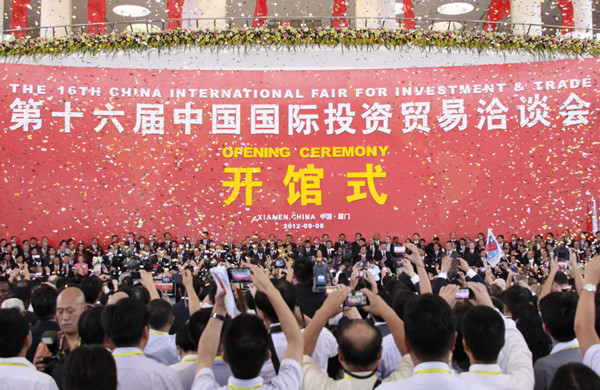'Foreign investment, capital' spur growth
 0 Comment(s)
0 Comment(s) Print
Print E-mail China Daily, September 10, 2012
E-mail China Daily, September 10, 2012
China should attach more importance to cross-border investment and the development of emerging industries to upgrade its industrial structure, according to trade officials, as a new era of industrial competition reshapes the global value chain.
 |
|
More than 600 delegations from 110 countries and regions gathered Saturday in the southeastern city of Xiamen to attend the 16th China International Fair for Investment and Trade (CIFIT). |
"The use of foreign capital and outward foreign investment are shortcuts for Chinese enterprises entering the global value chain," said Liu Yajun, director of the foreign investment administration at the Ministry of Commerce, at the China International Fair for Investment and Trade in Xiamen, Fujian province, on Sunday.
"At present, China still has a strong advantage in attracting foreign investment. Outward foreign investment in China is also developing very fast, and has won global recognition," he said.
Liu said having suffered the impact of the 2008 financial crisis, many countries are more careful in how they balance the relationship between the virtual economy and the real economy.
The United States and countries in Europe have launched re-industrialization strategies and called for reshoring by companies in their manufacturing industry, while emerging economies have also increased the intensity of their foreign investment.
"New global competition in the real economy has started," he said.
"Within this battle, we should further strengthen cooperation in cross-border investment to develop the real economy and upgrade the country's economic structure."
He said the Chinese government has always attached great importance to the real economy and the opening-up of the manufacturing sector.
"During the financial crisis, the Chinese government maintained steady economic growth, which we should be pride of.
"But we are not immune to the global financial crisis and have suffered. In this post-crisis era, the competition pressures we face will be even greater."
Liu said adjustments in the country's industrial structure are an important task for China in combating global competition.
To gain an advantage during this latest round of competition, and in developing local manufacturing, China should stress the growing importance of international cooperation, and seek deeper participation in international markets through increased cross-border flows of capital.
He said China's manufacturing sector has been developing since the beginning of China's opening-up process.
The scale of its participation in the global industrial chain has expanded greatly, but it's still at a low level compared with many other countries.
"Our next task should be to extend to the higher-end of the 'smiling curve', into design and marketing, as well as research and development."
The smiling curve theory proposed in 1992 by Stan Shih, founder of Acer Group, uses one curve pointing upward at both ends, indicating that in the industrial chain, added value is more reflected in R&D and sales, while the manufacturing is in the middle part of the curve, with minimum added value.
"This new round of industry competition will reshape the global value chain. China should focus on the development of high-tech, advanced manufacturing, the energy saving and environmental protection industry, new energy and other strategic emerging industries, to promote its escalation in the industrial structure," he said.
"We will not only gain greater benefit from the global value chain, but also contribute more to the international community," Liu said.
Edward Prescott, the 2004 Nobel laureate in economics, said on Saturday that the introduction of foreign investment and economic openness is the ideal path for less developed countries, especially for Asian countries, to catch up with developed ones.
On the other hand, he said for the US, still in economic recession, more of its multinational companies should be working to promote their economic activities.
According to Prescott, 40 percent of the income of US multinationals comes from foreign subsidiaries actively expanding their customer base to make their investment more specific and specialized.
"Cities like Beijing and Shanghai have become economic centers, and such decentralization of world's economic activity is meaningful to the economic development of China and the world," he added.





